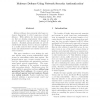Free Online Productivity Tools
i2Speak
i2Symbol
i2OCR
iTex2Img
iWeb2Print
iWeb2Shot
i2Type
iPdf2Split
iPdf2Merge
i2Bopomofo
i2Arabic
i2Style
i2Image
i2PDF
iLatex2Rtf
Sci2ools
114
click to vote
IWIA
2005
IEEE
2005
IEEE
Malware Defense Using Network Security Authentication
Malware defenses have primarily relied upon intrusion fingerprints to detect suspicious network behavior. While effective for discovering computers that are already compromised, these systems are not designed to stop the spread or damage of malware. Standard gateway firewalls can prevent outside-based attacks; however, they are ineffective in a mobile network where threats originate from inside and administrators have limited control over client machines. This paper introduces a new strategy for malware defense using security authentication which focuses on vulnerabilities rather than exploits. The proposed system uses a remote security scanner to check for vulnerabilities and quarantines machines using logical network segmentation. This maximizes the usefulness of the machine in question while preventing attacks. Furthermore given the unique ability to quarantine machines without any specialized host software, the proposed system can defend against internal malware threats in a m...
Related Content
| Added | 25 Jun 2010 |
| Updated | 25 Jun 2010 |
| Type | Conference |
| Year | 2005 |
| Where | IWIA |
| Authors | Joseph V. Antrosio, Errin W. Fulp |
Comments (0)

